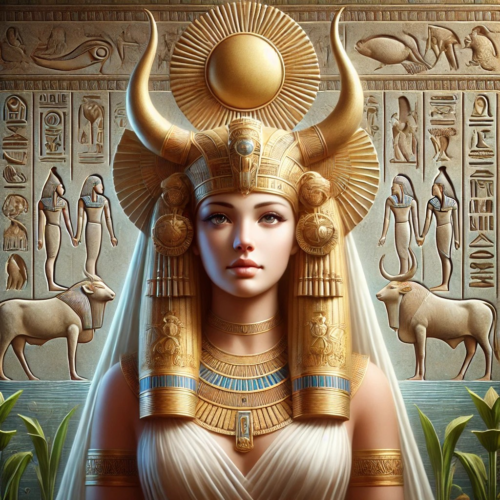Isis is one of the most significant and widely worshiped goddesses in ancient Egyptian mythology. She is celebrated as the goddess of motherhood, fertility, magic, and healing, embodying nurturing strength and divine power. Over time, her influence expanded far beyond Egypt, spreading throughout the Mediterranean and gaining widespread devotion.
Family and Origins
Isis was the daughter of Geb, the god of the earth, and Nut, the goddess of the sky. She was the sister and wife of Osiris, the god of the afterlife, and the devoted mother of Horus, the falcon-headed god of the sky and kingship. Together, this divine family played a central role in Egyptian mythology and the religious practices of ancient Egypt.

Roles and Symbolism
Isis is the protector of the dead and a goddess of the afterlife. Her presence was often depicted in funerary art, where she guarded the deceased and guided them toward eternal life. She wore a headdress in the shape of a throne, symbolizing her status as the divine queen. Sometimes, she was shown with cow’s horns and a solar disk, linking her to celestial power.
As a goddess of fertility and agriculture, Isis was deeply connected to the Nile River and its annual flooding. The ancient Egyptians believed that her association with the star Sirius heralded the life-giving floodwaters, which brought renewal and abundance to the land.
Mistress of Magic
Isis was renowned for her mastery of magic and healing. She was said to possess extraordinary powers, including the ability to heal the sick, protect the vulnerable, and even bring the dead back to life. According to legend, she used her magical skills to reassemble and revive her husband Osiris after he was murdered by their brother Set.
Her magical prowess also made her a symbol of protection. She was often invoked during childbirth, for personal safety, and in moments of crisis. Isis’s connection to magic and her ability to shape-shift further elevated her status as one of the most powerful deities in the Egyptian pantheon.
The Spread of Her Cult
In later periods, particularly during the Greco-Roman era, the cult of Isis transcended Egyptian borders, spreading throughout the Mediterranean and beyond. Temples dedicated to her worship were built in Greece, Rome, and other parts of the ancient world. Her appeal was especially strong among women, who saw her as a compassionate and nurturing goddess capable of aiding with fertility, childbirth, and family life.
Her followers celebrated her with festivals, rituals, and processions, keeping her legacy alive for centuries. Isis became a symbol of divine motherhood, and her devotion to her family resonated with many cultures.
Legacy
Isis’s influence endures as one of the most revered goddesses in ancient history. Her story represents love, resilience, and the transformative power of magic. Through her connection to motherhood, protection, and healing, Isis continues to be a symbol of divine care and strength.
